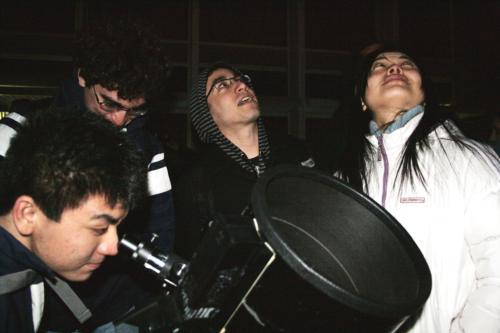
News
HMS Is Facing a Deficit. Under Trump, Some Fear It May Get Worse.

News
Cambridge Police Respond to Three Armed Robberies Over Holiday Weekend

News
What’s Next for Harvard’s Legacy of Slavery Initiative?

News
MassDOT Adds Unpopular Train Layover to Allston I-90 Project in Sudden Reversal

News
Denied Winter Campus Housing, International Students Scramble to Find Alternative Options
Students Venture to Science Center To Observe Lunar Eclipse

In a dark, crowded room on the tenth floor of the Science Center last night, students took turns looking through a telescope at an uncommon sight: the moon darkened rust-red by the shadow of the earth.
A French café mix played in the background, lending a dreamy quality to proceedings as students clambered onto a scaffold for a better view of the eclipse. Colorful paintings and photographs of outer space covered every inch of the walls, lit only by the skylight and a few dim, red lights.
Over a hundred people opted to head onto a chilly observation deck where the eclipse, which reached its peak at around 11 p.m., was framed by the Boston skyline.
“I’m surprised that it’s happening so fast,” said Robin W. Reinert ’10, who could not remember the last time she saw a lunar eclipse. She added, “I’m surprised that the part that’s left is brighter than when the moon is in a crescent.”
Total lunar eclipses occur when the sun, earth, and moon are in perfect alignment, an event that won’t occur again until 2010, according to NASA. The last lunar eclipse was on August 28th, 2007.
While partial lunar eclipses occur at least twice a year, the moon’s orbital plane is not always perfectly aligned with the Earth’s.
The event was organized via e-mail by Daniel A. Handlin ’11, who noted that many people were attracted to the observatory by word of mouth and by CNN reports of the eclipse. According to Handlin, who is also a Crimson news writer, the moon was tinted red because of atmospheric disturbance. Clouds prevented the sight from being crystal clear, but Handlin said that the visibility was “better than I thought it would be.”
Larissa Zhou ’10, a joint Physics and Earth and Planetary Sciences concentrator, said that seeing the eclipse with the naked eye was a sharp contrast to studying much more distant heavenly bodies like Jupiter. Zhou said that her academic observations are much more weather-sensitive.
“Any amount of moisture would destroy our data,” Zhou said.
—Staff writer Lingbo Li can be reached at lingboli@fas.harvard.edu.
Want to keep up with breaking news? Subscribe to our email newsletter.
